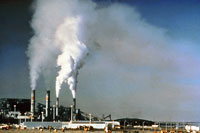Chemical Enterprises To Kill 3 Million Russians
The level of air pollution in Russian cities considerably exceeds the norms even under the conditions of the economic crisis, when the volume of production is lower than it was before.

A toxic cloud appeared above the city of Vladikavkaz in the fall of 2009, which made people come out to the streets to protest against the chemical genocide. The administration of a city factory was fired as a result of the meeting.
Several factories producing formaldehyde resin were built in Russia’s Ryazan region. As soon as the factories were ready, the owners of small private farms started saying that their barnyard fowl would give birth to three-legged ducklings and chickens. Local residents organized massive protest actions, and all of the chemical factories were shut down and demolished.
“Europe has refused from such productions entirely. The import of furniture built with the use of formaldehyde resin is legally banned in the countries of the European Union. Formaldehyde is a very toxic chemical – it can be compared to nuclear and radioactive substances. If the factories had not been closed in Ryazan, it would have resulted in an epidemic of cancerous diseases in the region. Phenol-formaldehyde triggers mutations in the human organism,” biologist Vera Dronnik said.
When the construction of the formaldehyde factory started in 2007, local residents originally thought that the authorities were building a kindergarten. They later thought that it would be a marketplace. When the truth was finally unveiled, the residents held a regional referendum to find out people’s opinion about the construction of the chemical plant. Most of the people – 92.5 percent – said that they did not want the factory to be built in the town. The authorities disregarded the results, though, and did not stop the construction.
“We conducted an experiment to find out to which extent severe diseases were spread in the town. It turned out that a small street with only 42 people living there had 17 cancer patients. The chemical factory would have given cancer and mutations to everyone else,” the biologist said.
There were counter-arguments too. The chemical factory promised new jobs, which was highly important for the region. However, the factory started employing people from neighboring areas, where it was registered. It just so happened that the formaldehyde plant did not promise anything but poison to people.
Ecologists gave no peace to local and regional authorities. They sued the administration of the factory, asked for help from ecological organizations in other countries, and even built a tent township near the construction site in the summer of 2008.
The authorities finally gave up. The governor of the region signed a decree to terminate the agreement with the factory owners.
Boris Revich, a Doctor of Medical Sciences, said that bad ecology adds ten percent to population mortality rate. This percentage makes 40,000 people a year, which can be compared to the population of a whole town.
Russian ecologists are concerned about the growing number of coal-powered power plants in the country. Their wastes trigger the development of various lethal diseases – from asthma to lung cancer. The problems related to the pollution of atmosphere, water and soil need to be solved at the top level. Otherwise, people would have to move out in the woods to save their lives.
It is quite difficult to find out which cities in Russia are polluted most. The Ministry for Nature makes the lists of territories where the air pollution is intensive, but the new data come one year late due to bureaucratic hurdles. Other ratings can be either subjective or not true to fact.
“In the city of Lipetsk, for instance, they do their best to conceal the information about the impact of the local metallurgical factor on the environment. There are regions, where local authorities do not say anything about ecology, Vyacheslav Fyodorov of Green Patrol said.
Experts say that metallurgical, chemical, mining and oil refining enterprises show most harmful influence on the environment.
The harmful influence of industrial enterprises on the environment is a lot less in foreign countries. People do not live near factories in Europe. The construction of industrial enterprises in the West always stipulates purifying technologies. About 30 percent of funds are invested in the construction of cleansing structures.
In Russia, about 3 million people live in sanitary protection zones – in the area of industrial emissions – for decades.
Arguments and Facts
Subscribe to Pravda.Ru Telegram channel, Facebook, RSS!


